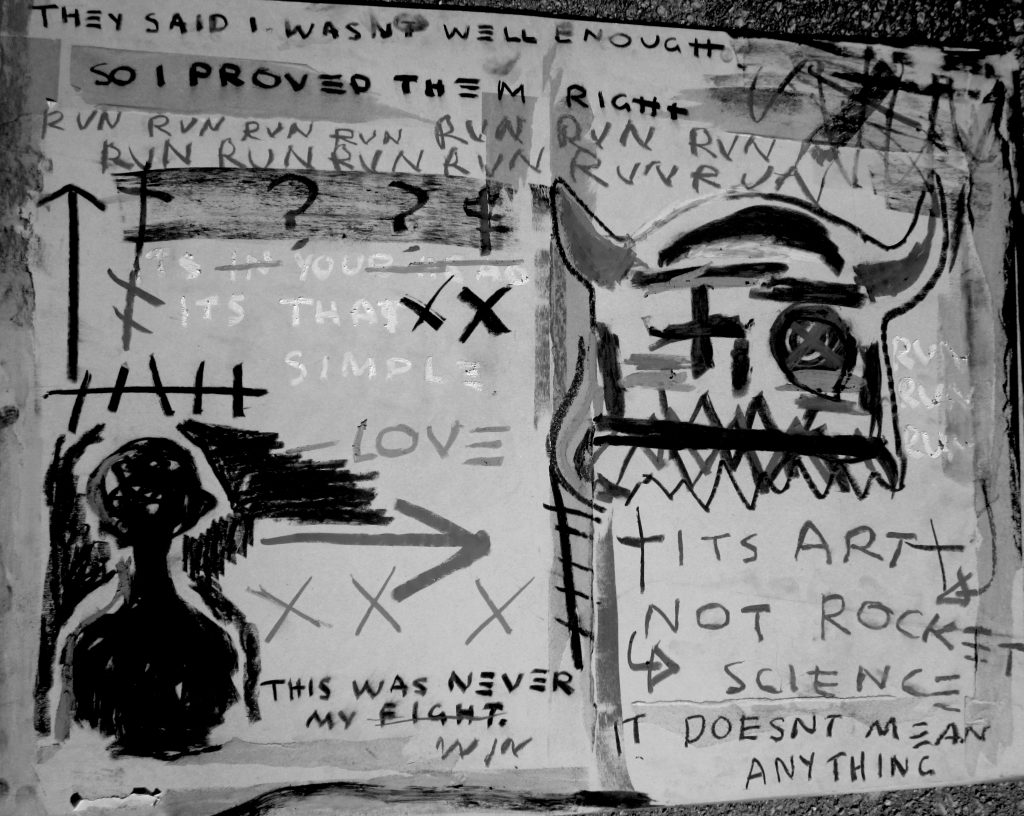Words by Kristen Pegoraro
Images by Amber Ryder
Content warning: this piece discusses abusive relationships and gaslighting.
There was a girl. She was bright and bubbly. She had dreams and desires. She had a large friendship group and a smile that you could spot from across the room. She liked to listen to indie rock and wear floral skirts to class on Fridays. Sometimes, she would curl her hair and when she felt confident, she would go makeup free on a day out. She was unapologetically herself. When she was younger, she would go to the park with her dad and play on the swings. One day she told her dad that she wished she could take photos with her eyes, so she could capture the birds and the trees and how beautiful they are.
Slow tempo jazz fills the speakers at a bar. The girl lines up for a drink, hot from saturday night people traffic. She orders herself a gin and tonic with extra lime. About to pay, she is interrupted, a tall guy beside her smirks and says, ‘the drinks are on me, this girl has impeccable taste’. With one silly smile, she fell for him.
They are at a park celebrating their one year anniversary with a picnic. He looks up at the sky as he bites into a strawberry and says, ‘do you ever just wish we had cameras in our eyes to capture moments like this?’. She smiles, feeling so lucky to be with someone who sees the world the way that she does.
There are so many definitions of gas lighting floating around, however, this one originally appearing in Urban Dictionary resonated with me the most:
“A covert form of manipulation, intimidation or psychological abuse, where false information is presented to the victim, to sow seeds of doubt and to make them question their own memory, perception and sanity.”
Dr Lauren Rosewarne of Melbourne University says that gaslighting is “similar to abusive behaviour, but slightly different.”
“We need to determine whether gaslighters know what they are doing; I am not sure this is always the case,” she says.
“For those who do gas light, they will be doing so to manipulate, to abuse and to gain authority.”
***
One night in March, they are at a party. She speaks to one of her friends from literature class. He stands by the firepit watching, a drink in hand. She is having fun, but her guy wants to leave early. When they get home, he tells her that she was being flirty and inappropriate with her friend. She tells him that he is wrong, but he continues, saying that she kept touching her friend’s arm and that he heard her telling him that she likes him. He said that she is like this at every party after she has had a few drinks and that she fails to see it. She tries to reassure him and when he argues with her she cries because he won’t listen.
He won’t stop saying the same thing over and over again, “you are going to leave me for him, I can see the way you act around him, so can everyone else”. He tells her “no one will ever love you like I do. I love you for you”. They have had this fight so many times that she is starting to believe that maybe she is the bad guy and that she is going crazy because she is the only one that can’t see her own disloyalty. He has gotten the reaction that he wants, yet he sits there and tells her she doesn’t deserve to cry because she is the one ruining their relationship.
***
Dr. Rosewarne acknowledges that gas lighting “is behaviour more commonly associated with male perpetrators”. It happens in relationships, in the workplace and also in friendships. However in response to how common it is, she says it is “almost impossible to gauge, but my hunch would be that most women have experienced it. For the past few years we’ve certainly had more interest in the idea as a culture, even though the idea has been around since 1938 in play and then film in the 1940s.”
***
It’s been two years. He tells her that none of her friends like her because she spends too much time with her boyfriend. He tells her that when she drinks, she flirts with everyone around her. He tells her that she kissed another guy at a party she doesn’t even remember going to, but he will forgive her. She doesn’t go to bars anymore and wears plain clothes on Fridays. She keeps her hair straight because that’s the way he said she has always liked it and he tells her that when she wears floral she isn’t herself. She doesn’t listen to music anymore and her smiles are rare. She thinks that despite the fact he cheated on her, the failure of her relationship is her fault, that she lost control, that she betrayed him.
The thing is, she can’t remember ever doing one of those things. In fact, she can’t remember the last time she looked in the mirror and thought ‘this is who I am and I am okay with that’, because over time, she has forgotten who she is and why she started feeling hopeless in the first place.
Having been a victim to this abuse myself, the best way I can explain the feeling is a little like when, you hear a lie so often, that soon enough it becomes accepted as the truth. Now relate that to human relationships, eventually if someone controls your thoughts for so long, eventually you are going to believe everything they say. I was questioning my own sanity in specific situations; what I was experiencing was gaslighting behaviour. When I spoke to a professional about my own experiences, they suggested that it is easy to confuse gaslighting with other abusive behaviour.
***
It is her 20th birthday. He has organised a dinner for her and invited all his friends. His closest friend sits at the head of the table beside her. Mains are served and she is still yet to speak more than a few whispers. His best friend leans over to her and says “you are not yourself anymore, he’s not good for you”. This moment, these words and the person they came from—all significant parts of when she realises that she is being emotionally manipulated by the person she loves and needs to get out.
***
According to Dr. Rosewarne, if anyone ever finds themselves suddenly questioning their own sanity or their own recollections of an event following a conversation with someone, then certainly there is a possibility that they have experienced some gaslighting.
If this article has brought up any issues for you, or if you would like to seek help:
RMIT offers one-on-one free counselling services to students. For all counselling appointments at the City, Bundoora or Brunswick campus, phone: 03 9925 4365 (9am–5pm, Monday–Friday)
You can also drop by Compass, RUSU’s drop in space catering to student welfare. They provide information, referral and advice about any issues students may be experiencing. Visit rusu.rmit.edu.au/compass for more information
You can also call 1800 RESPECT for 24 hour support if you are experiencing sexual assault, family or domestic violence and abuse.




